Social Media Benefits for Society and Business
VerifiedAdded on 2023/03/23
|5
|1620
|95
AI Summary
This paper explores the benefits of social media for society and business, including connectivity, stress reduction, marketing, and knowledge sharing. It also discusses the potential drawbacks and the need for proper management and policies.
Contribute Materials
Your contribution can guide someone’s learning journey. Share your
documents today.
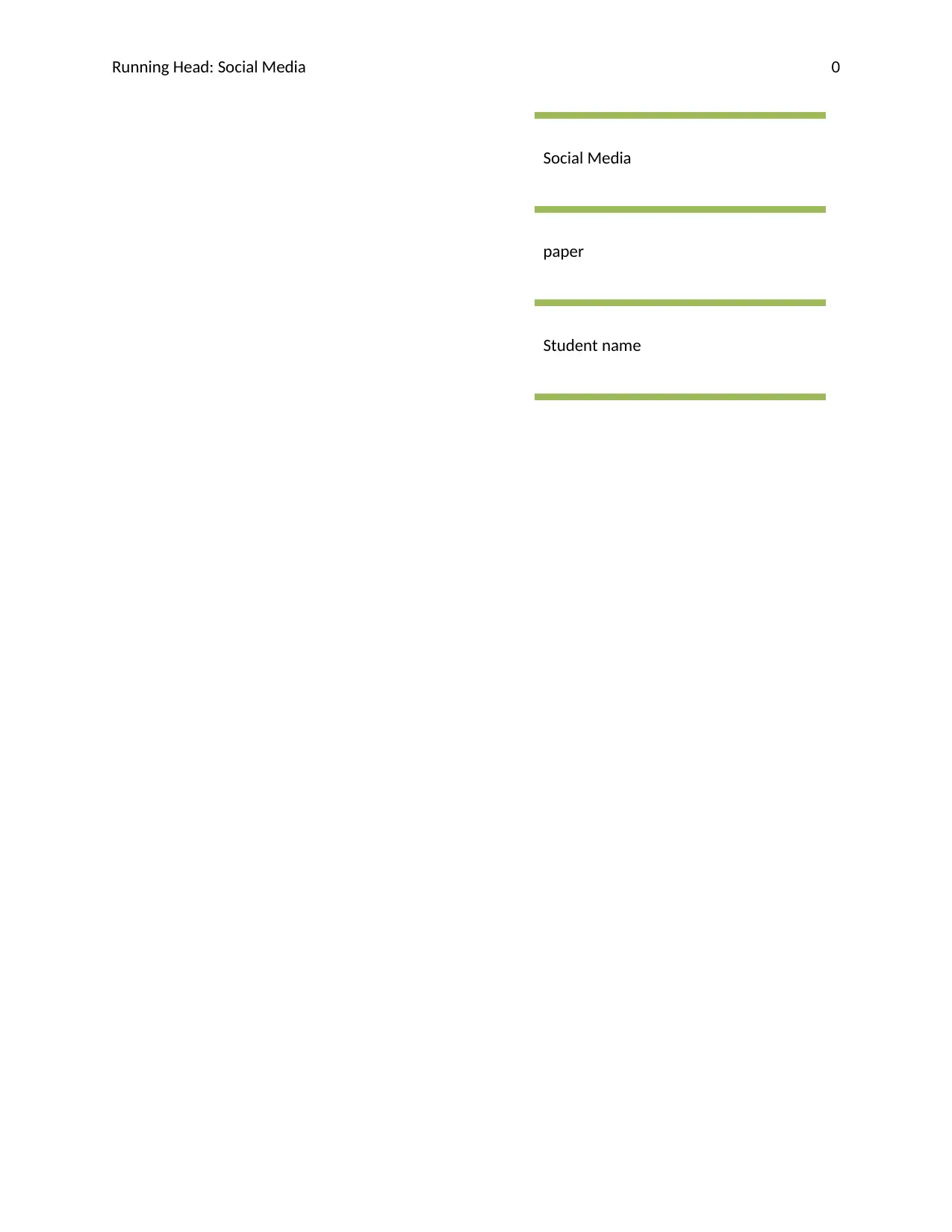
Running Head: Social Media 0
Social Media
paper
Student name
Social Media
paper
Student name
Secure Best Marks with AI Grader
Need help grading? Try our AI Grader for instant feedback on your assignments.
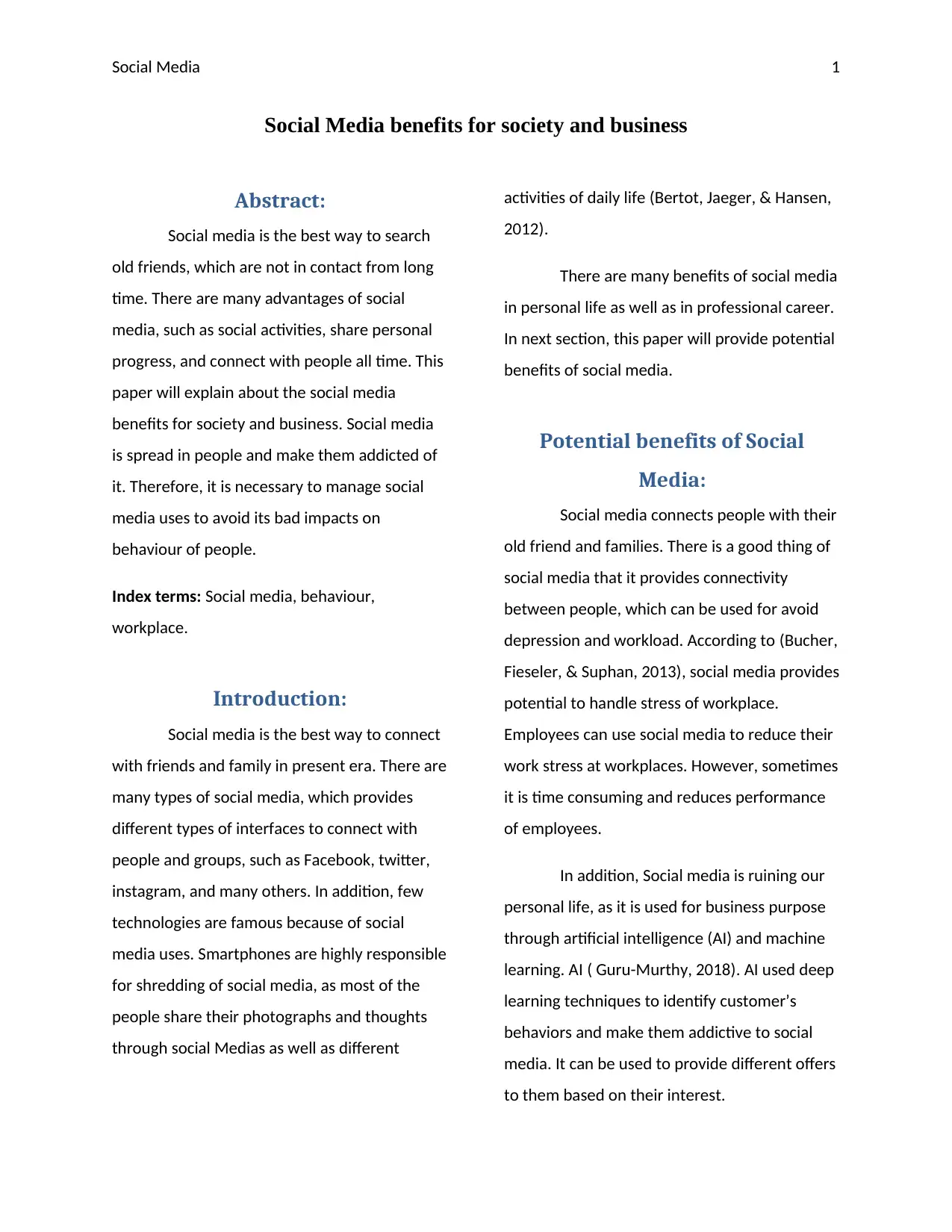
Social Media 1
Social Media benefits for society and business
Abstract:
Social media is the best way to search
old friends, which are not in contact from long
time. There are many advantages of social
media, such as social activities, share personal
progress, and connect with people all time. This
paper will explain about the social media
benefits for society and business. Social media
is spread in people and make them addicted of
it. Therefore, it is necessary to manage social
media uses to avoid its bad impacts on
behaviour of people.
Index terms: Social media, behaviour,
workplace.
Introduction:
Social media is the best way to connect
with friends and family in present era. There are
many types of social media, which provides
different types of interfaces to connect with
people and groups, such as Facebook, twitter,
instagram, and many others. In addition, few
technologies are famous because of social
media uses. Smartphones are highly responsible
for shredding of social media, as most of the
people share their photographs and thoughts
through social Medias as well as different
activities of daily life (Bertot, Jaeger, & Hansen,
2012).
There are many benefits of social media
in personal life as well as in professional career.
In next section, this paper will provide potential
benefits of social media.
Potential benefits of Social
Media:
Social media connects people with their
old friend and families. There is a good thing of
social media that it provides connectivity
between people, which can be used for avoid
depression and workload. According to (Bucher,
Fieseler, & Suphan, 2013), social media provides
potential to handle stress of workplace.
Employees can use social media to reduce their
work stress at workplaces. However, sometimes
it is time consuming and reduces performance
of employees.
In addition, Social media is ruining our
personal life, as it is used for business purpose
through artificial intelligence (AI) and machine
learning. AI ( Guru-Murthy, 2018). AI used deep
learning techniques to identify customer’s
behaviors and make them addictive to social
media. It can be used to provide different offers
to them based on their interest.
Social Media benefits for society and business
Abstract:
Social media is the best way to search
old friends, which are not in contact from long
time. There are many advantages of social
media, such as social activities, share personal
progress, and connect with people all time. This
paper will explain about the social media
benefits for society and business. Social media
is spread in people and make them addicted of
it. Therefore, it is necessary to manage social
media uses to avoid its bad impacts on
behaviour of people.
Index terms: Social media, behaviour,
workplace.
Introduction:
Social media is the best way to connect
with friends and family in present era. There are
many types of social media, which provides
different types of interfaces to connect with
people and groups, such as Facebook, twitter,
instagram, and many others. In addition, few
technologies are famous because of social
media uses. Smartphones are highly responsible
for shredding of social media, as most of the
people share their photographs and thoughts
through social Medias as well as different
activities of daily life (Bertot, Jaeger, & Hansen,
2012).
There are many benefits of social media
in personal life as well as in professional career.
In next section, this paper will provide potential
benefits of social media.
Potential benefits of Social
Media:
Social media connects people with their
old friend and families. There is a good thing of
social media that it provides connectivity
between people, which can be used for avoid
depression and workload. According to (Bucher,
Fieseler, & Suphan, 2013), social media provides
potential to handle stress of workplace.
Employees can use social media to reduce their
work stress at workplaces. However, sometimes
it is time consuming and reduces performance
of employees.
In addition, Social media is ruining our
personal life, as it is used for business purpose
through artificial intelligence (AI) and machine
learning. AI ( Guru-Murthy, 2018). AI used deep
learning techniques to identify customer’s
behaviors and make them addictive to social
media. It can be used to provide different offers
to them based on their interest.
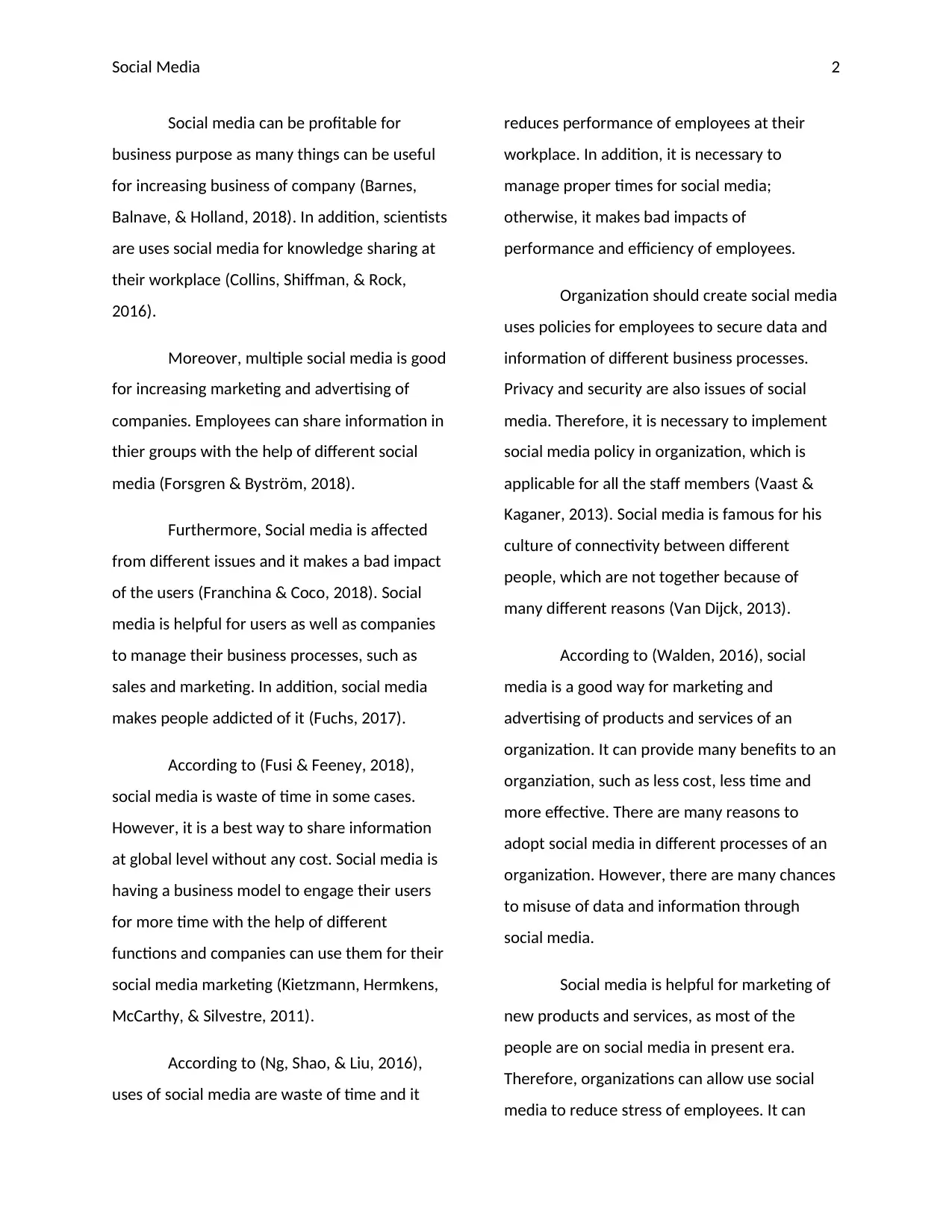
Social Media 2
Social media can be profitable for
business purpose as many things can be useful
for increasing business of company (Barnes,
Balnave, & Holland, 2018). In addition, scientists
are uses social media for knowledge sharing at
their workplace (Collins, Shiffman, & Rock,
2016).
Moreover, multiple social media is good
for increasing marketing and advertising of
companies. Employees can share information in
thier groups with the help of different social
media (Forsgren & Byström, 2018).
Furthermore, Social media is affected
from different issues and it makes a bad impact
of the users (Franchina & Coco, 2018). Social
media is helpful for users as well as companies
to manage their business processes, such as
sales and marketing. In addition, social media
makes people addicted of it (Fuchs, 2017).
According to (Fusi & Feeney, 2018),
social media is waste of time in some cases.
However, it is a best way to share information
at global level without any cost. Social media is
having a business model to engage their users
for more time with the help of different
functions and companies can use them for their
social media marketing (Kietzmann, Hermkens,
McCarthy, & Silvestre, 2011).
According to (Ng, Shao, & Liu, 2016),
uses of social media are waste of time and it
reduces performance of employees at their
workplace. In addition, it is necessary to
manage proper times for social media;
otherwise, it makes bad impacts of
performance and efficiency of employees.
Organization should create social media
uses policies for employees to secure data and
information of different business processes.
Privacy and security are also issues of social
media. Therefore, it is necessary to implement
social media policy in organization, which is
applicable for all the staff members (Vaast &
Kaganer, 2013). Social media is famous for his
culture of connectivity between different
people, which are not together because of
many different reasons (Van Dijck, 2013).
According to (Walden, 2016), social
media is a good way for marketing and
advertising of products and services of an
organization. It can provide many benefits to an
organziation, such as less cost, less time and
more effective. There are many reasons to
adopt social media in different processes of an
organization. However, there are many chances
to misuse of data and information through
social media.
Social media is helpful for marketing of
new products and services, as most of the
people are on social media in present era.
Therefore, organizations can allow use social
media to reduce stress of employees. It can
Social media can be profitable for
business purpose as many things can be useful
for increasing business of company (Barnes,
Balnave, & Holland, 2018). In addition, scientists
are uses social media for knowledge sharing at
their workplace (Collins, Shiffman, & Rock,
2016).
Moreover, multiple social media is good
for increasing marketing and advertising of
companies. Employees can share information in
thier groups with the help of different social
media (Forsgren & Byström, 2018).
Furthermore, Social media is affected
from different issues and it makes a bad impact
of the users (Franchina & Coco, 2018). Social
media is helpful for users as well as companies
to manage their business processes, such as
sales and marketing. In addition, social media
makes people addicted of it (Fuchs, 2017).
According to (Fusi & Feeney, 2018),
social media is waste of time in some cases.
However, it is a best way to share information
at global level without any cost. Social media is
having a business model to engage their users
for more time with the help of different
functions and companies can use them for their
social media marketing (Kietzmann, Hermkens,
McCarthy, & Silvestre, 2011).
According to (Ng, Shao, & Liu, 2016),
uses of social media are waste of time and it
reduces performance of employees at their
workplace. In addition, it is necessary to
manage proper times for social media;
otherwise, it makes bad impacts of
performance and efficiency of employees.
Organization should create social media
uses policies for employees to secure data and
information of different business processes.
Privacy and security are also issues of social
media. Therefore, it is necessary to implement
social media policy in organization, which is
applicable for all the staff members (Vaast &
Kaganer, 2013). Social media is famous for his
culture of connectivity between different
people, which are not together because of
many different reasons (Van Dijck, 2013).
According to (Walden, 2016), social
media is a good way for marketing and
advertising of products and services of an
organization. It can provide many benefits to an
organziation, such as less cost, less time and
more effective. There are many reasons to
adopt social media in different processes of an
organization. However, there are many chances
to misuse of data and information through
social media.
Social media is helpful for marketing of
new products and services, as most of the
people are on social media in present era.
Therefore, organizations can allow use social
media to reduce stress of employees. It can
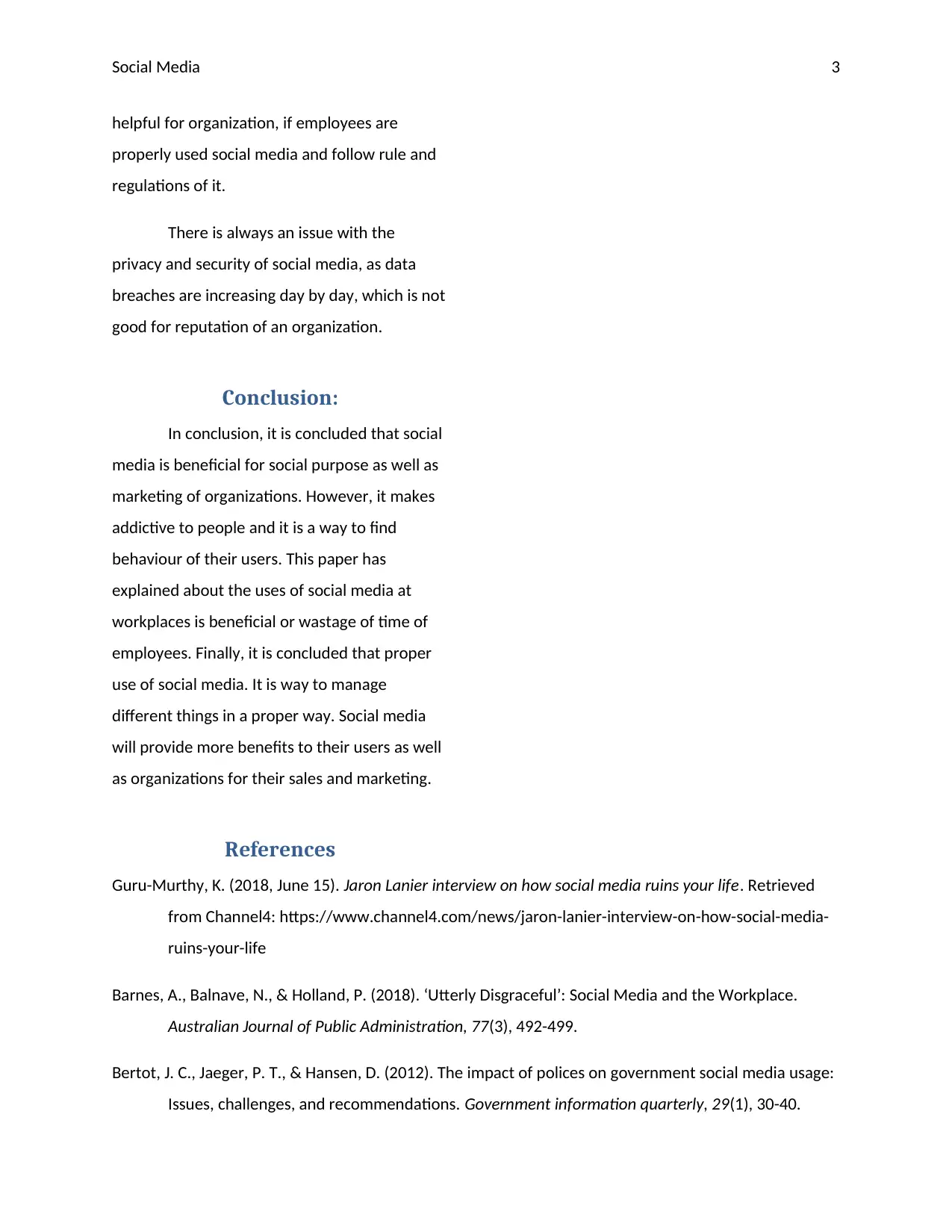
Social Media 3
helpful for organization, if employees are
properly used social media and follow rule and
regulations of it.
There is always an issue with the
privacy and security of social media, as data
breaches are increasing day by day, which is not
good for reputation of an organization.
Conclusion:
In conclusion, it is concluded that social
media is beneficial for social purpose as well as
marketing of organizations. However, it makes
addictive to people and it is a way to find
behaviour of their users. This paper has
explained about the uses of social media at
workplaces is beneficial or wastage of time of
employees. Finally, it is concluded that proper
use of social media. It is way to manage
different things in a proper way. Social media
will provide more benefits to their users as well
as organizations for their sales and marketing.
References
Guru-Murthy, K. (2018, June 15). Jaron Lanier interview on how social media ruins your life. Retrieved
from Channel4: https://www.channel4.com/news/jaron-lanier-interview-on-how-social-media-
ruins-your-life
Barnes, A., Balnave, N., & Holland, P. (2018). ‘Utterly Disgraceful’: Social Media and the Workplace.
Australian Journal of Public Administration, 77(3), 492-499.
Bertot, J. C., Jaeger, P. T., & Hansen, D. (2012). The impact of polices on government social media usage:
Issues, challenges, and recommendations. Government information quarterly, 29(1), 30-40.
helpful for organization, if employees are
properly used social media and follow rule and
regulations of it.
There is always an issue with the
privacy and security of social media, as data
breaches are increasing day by day, which is not
good for reputation of an organization.
Conclusion:
In conclusion, it is concluded that social
media is beneficial for social purpose as well as
marketing of organizations. However, it makes
addictive to people and it is a way to find
behaviour of their users. This paper has
explained about the uses of social media at
workplaces is beneficial or wastage of time of
employees. Finally, it is concluded that proper
use of social media. It is way to manage
different things in a proper way. Social media
will provide more benefits to their users as well
as organizations for their sales and marketing.
References
Guru-Murthy, K. (2018, June 15). Jaron Lanier interview on how social media ruins your life. Retrieved
from Channel4: https://www.channel4.com/news/jaron-lanier-interview-on-how-social-media-
ruins-your-life
Barnes, A., Balnave, N., & Holland, P. (2018). ‘Utterly Disgraceful’: Social Media and the Workplace.
Australian Journal of Public Administration, 77(3), 492-499.
Bertot, J. C., Jaeger, P. T., & Hansen, D. (2012). The impact of polices on government social media usage:
Issues, challenges, and recommendations. Government information quarterly, 29(1), 30-40.
Paraphrase This Document
Need a fresh take? Get an instant paraphrase of this document with our AI Paraphraser
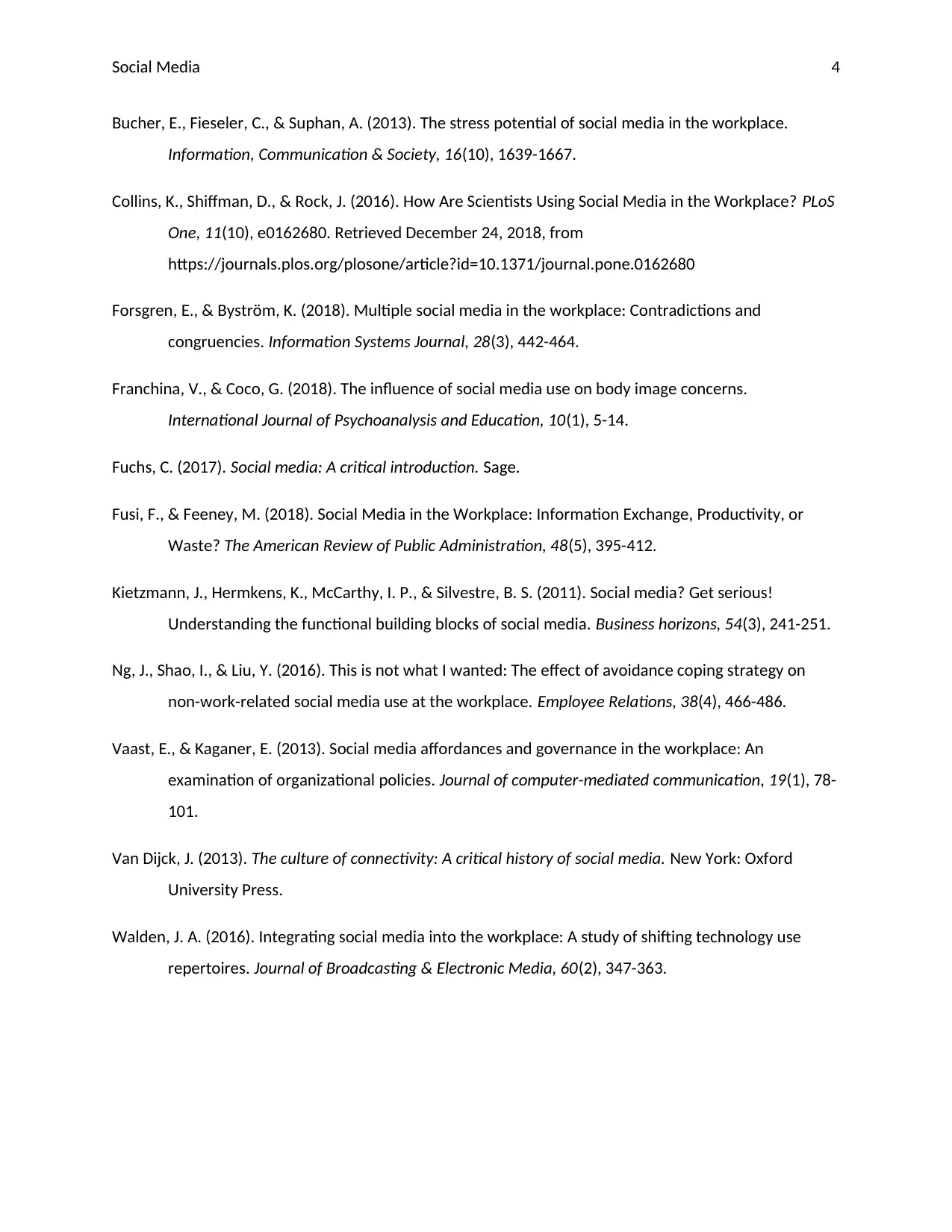
Social Media 4
Bucher, E., Fieseler, C., & Suphan, A. (2013). The stress potential of social media in the workplace.
Information, Communication & Society, 16(10), 1639-1667.
Collins, K., Shiffman, D., & Rock, J. (2016). How Are Scientists Using Social Media in the Workplace? PLoS
One, 11(10), e0162680. Retrieved December 24, 2018, from
https://journals.plos.org/plosone/article?id=10.1371/journal.pone.0162680
Forsgren, E., & Byström, K. (2018). Multiple social media in the workplace: Contradictions and
congruencies. Information Systems Journal, 28(3), 442-464.
Franchina, V., & Coco, G. (2018). The influence of social media use on body image concerns.
International Journal of Psychoanalysis and Education, 10(1), 5-14.
Fuchs, C. (2017). Social media: A critical introduction. Sage.
Fusi, F., & Feeney, M. (2018). Social Media in the Workplace: Information Exchange, Productivity, or
Waste? The American Review of Public Administration, 48(5), 395-412.
Kietzmann, J., Hermkens, K., McCarthy, I. P., & Silvestre, B. S. (2011). Social media? Get serious!
Understanding the functional building blocks of social media. Business horizons, 54(3), 241-251.
Ng, J., Shao, I., & Liu, Y. (2016). This is not what I wanted: The effect of avoidance coping strategy on
non-work-related social media use at the workplace. Employee Relations, 38(4), 466-486.
Vaast, E., & Kaganer, E. (2013). Social media affordances and governance in the workplace: An
examination of organizational policies. Journal of computer-mediated communication, 19(1), 78-
101.
Van Dijck, J. (2013). The culture of connectivity: A critical history of social media. New York: Oxford
University Press.
Walden, J. A. (2016). Integrating social media into the workplace: A study of shifting technology use
repertoires. Journal of Broadcasting & Electronic Media, 60(2), 347-363.
Bucher, E., Fieseler, C., & Suphan, A. (2013). The stress potential of social media in the workplace.
Information, Communication & Society, 16(10), 1639-1667.
Collins, K., Shiffman, D., & Rock, J. (2016). How Are Scientists Using Social Media in the Workplace? PLoS
One, 11(10), e0162680. Retrieved December 24, 2018, from
https://journals.plos.org/plosone/article?id=10.1371/journal.pone.0162680
Forsgren, E., & Byström, K. (2018). Multiple social media in the workplace: Contradictions and
congruencies. Information Systems Journal, 28(3), 442-464.
Franchina, V., & Coco, G. (2018). The influence of social media use on body image concerns.
International Journal of Psychoanalysis and Education, 10(1), 5-14.
Fuchs, C. (2017). Social media: A critical introduction. Sage.
Fusi, F., & Feeney, M. (2018). Social Media in the Workplace: Information Exchange, Productivity, or
Waste? The American Review of Public Administration, 48(5), 395-412.
Kietzmann, J., Hermkens, K., McCarthy, I. P., & Silvestre, B. S. (2011). Social media? Get serious!
Understanding the functional building blocks of social media. Business horizons, 54(3), 241-251.
Ng, J., Shao, I., & Liu, Y. (2016). This is not what I wanted: The effect of avoidance coping strategy on
non-work-related social media use at the workplace. Employee Relations, 38(4), 466-486.
Vaast, E., & Kaganer, E. (2013). Social media affordances and governance in the workplace: An
examination of organizational policies. Journal of computer-mediated communication, 19(1), 78-
101.
Van Dijck, J. (2013). The culture of connectivity: A critical history of social media. New York: Oxford
University Press.
Walden, J. A. (2016). Integrating social media into the workplace: A study of shifting technology use
repertoires. Journal of Broadcasting & Electronic Media, 60(2), 347-363.
1 out of 5
![[object Object]](/_next/static/media/star-bottom.7253800d.svg)





